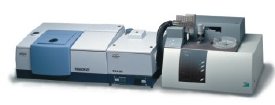For 15 years, Netzsch Analyzing & Testing and Bruker Optics have been providing their customers an optimal combination of two analysis techniques. According to the motto "TG plus FTIR - More than just the sum of its parts!" - the coupling of thermogravimetry (TG) and Fourier-Transform infrared spectroscopy provides its users a significant additional benefit and a comprehensive gain in information.

While thermogravimetry yields information regarding characteristics and thermal stability of materials, FT-IR spectroscopy is an established method for indentifying substances and quantifying sample components. So the combination of both techniques opens up new possibilities for analyzing macroscopic material characteristics on molecular level.
The Netzsch/Bruker-TG-FTIR-coupling has been developed by engineers of both companies. The main goal of this close cooperation has been to find an optimal combination of the two analysis systems with regard to capacity and ease-of-use of the complete system.
With the TG-FTIR coupling, both companies provide their customers a unique system for analyzing important material properties. In the field of polymer manufacturing and processing, for example, additives can be identified and even quantified. Moreover, the coupling technique gives a valuable insight into the aging and decomposition processes, even in interaction with different atmospheres.
The identification and quantification of solvent residues as well as the determination of the storage stability of formulations are by now routine methods in the pharmaceutical industry, but only the TG-FTIR coupling is capable of yielding these measurement results with only one single experiment. The number of possible fields of application is immense because the combination of thermal and molecular- spectroscopic analyses is capable of revealing fundamental chemical and physical properties of a huge number of materials.
Over the years, both companies have been constantly improving this TG-FTIR coupling technique to offer the best possible solution for the individual analytical questions of their customers. Besides the optimal combination of both analysis techniques, companies also focus on a competent customer service. For this reason, supporting customers on application matters, offering training courses and organizing information events will be an integral part of this successful cooperation also in the future.